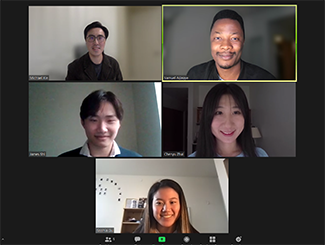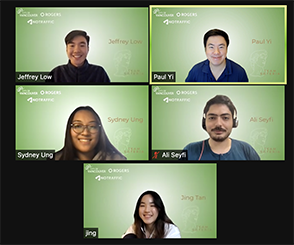At 8:55 am on Saturday, October 16, while most of their contemporaries were still sleeping, 52 UBC students from five faculties were hard at work in the latest UBC-Rogers 5G Case Competition. Co-hosted by UBC and Rogers in collaboration with the City of Vancouver (CoV) and NoTraffic, the virtual competition challenged student teams to find solutions to CoV traffic congestion using 5G technology.
The teams were presented with a challenge: You have just started working as a traffic specialist at the City of Vancouver and your boss has asked you to make a case to outline how to convince the city to leverage 5G, IoT and smart traffic technology.
Vancouver is the most congested city in Canada and the second-most congested in North America (CoV Staff, 2021). making the topic especially relevant. Even more so, considering that while Vancouver residents pay the highest carbon tax in North America, carbon emissions in the city continue to rise (Sims, 2021).
The case competition provided a timely and synergistic forum for hands-on student learning while advancing the shared goals of the partners: UBC’s longstanding commitment to sustainability and experiential learning; CoV’s desire to reduce traffic congestion, accidents and emissions; NoTraffic’s aim to synchronize traffic lights and flow; and Rogers’ vision of the role 5G communications can play in realizing these shared goals and benefits for society.
The multidisciplinary teams researched and identified solutions, using traffic data and other materials from CoV, NoTraffic, UBC and Rogers, while benefitting from the guidance of 10 volunteer CoV, Rogers and NoTraffic mentors.
The three teams approached the competition with very different solutions. They were judged on six criteria: problem definition and understanding; suitability; feasibility; innovation and creativity; presentation; and group participation. The judges included Paul Storer, Director of Transportation, CoV; Andrea Lloyd, Associate Director, Engagement, entrepreneurship@UBC (e@UBC); Roopesh Patel, Director, Internet of Things, Rogers Communications; and Justin Effinger, Senior Traffic Engineer, NoTraffic.
The winning team proposed building an IOT platform to incentivize zero-emission behaviour among the public. Their twofold solution would leverage 5G to connect high-power multi-edge computing (MEC) devices and traffic sensors, with a strategy to facilitate adoption by partnering with vehicle navigation apps, and a multi-phased rollout to track plan efficiency/progress.

Second Place Team: Benjamin Corbett, Aliya Zhang, Ben Cheung, Aidan Shields, Karina Akhemdova, and Usama Jillani
The second-place team addressed challenges related to transit delays and associated economic and environmental costs. They proposed that 5G-connected buses and rider data could be used to trigger traffic signals, reducing travel time while maximizing space efficiency. This would in turn reduce the number of vehicles on the road, their idling time and associated emissions, and emergency vehicle response times.
The third-place team proposed use of a mobile application to crowdsource data from 5G-connected devices in order to help drivers find the fastest route, ensure safety and protect the environment.
Case competitions will continue to be an important part of UBC-industry partnerships moving forward, since they provide crucial experiential learning opportunities for students, and a chance to showcase their talents. The competitions also generate promising solutions to pressing societal problems and help build partnerships with industry. In the context of the UBC-Rogers partnership, students can address highly relevant real-world problems that directly affect them—like Vancouver traffic congestion—using 5G technology that will soon become part of everyday life. For companies, the competitions provide a forum to meet potential interns or hires with relevant expertise, and to observe them performing under pressure in a team-based context.
As Neel Dayal, Director of Innovation and Partnerships at Rogers Communications, says, “Seeing the UBC students in action is always inspiring. The Case Competition really allowed for the students to showcase their creativity along with their strong analytical skills and demonstrate the true value of 5G in a Smart City context.”
Student participant Aliya Zhang had this to say about the competition: “As an aspiring transportation engineer, I was excited that this competition exposed me to new innovations and technologies in this field that will no doubt challenge our current design practices and shift our city’s transportation systems to become more efficient, sustainable, and equitable.”
About UBC and Rogers: UBC and Rogers have partnered since 2018. As a Canadian leader in 5G innovation, Rogers appreciates the potential of collaborating with UBC researchers and leveraging UBC’s experience in utilizing its campus as a living lab. For UBC, the partnership with Rogers is an ideal vehicle for supporting a wide range of multidisciplinary research while exposing students to a unique learning experience in the context of stakeholder-engaged research.
UBC became North America’s first 5G campus network in November 2019—expanding UBC’s Living Lab research into the telecommunications realm. The partnership is a collaborative process in which both partners agree on research projects and student engagement opportunities to move forward, in an evolving process. This openness has generated a number of exciting collaborations that address both the fundamentals of 5G and development of applications, in a new model for university-industry partnerships.
Rogers and UBC have previously co-hosted the Rogers Edge Codeathon in October 2019 and the UBC/Rogers Smart Cities Ideation Challenge in March 2020.

